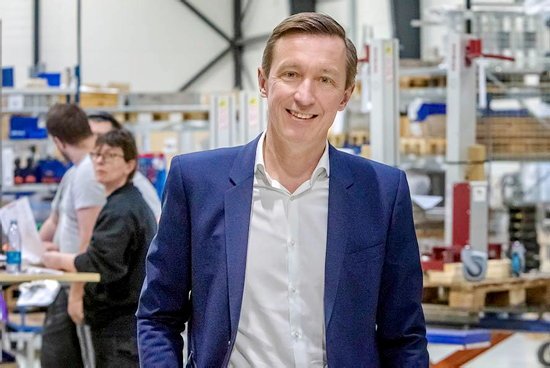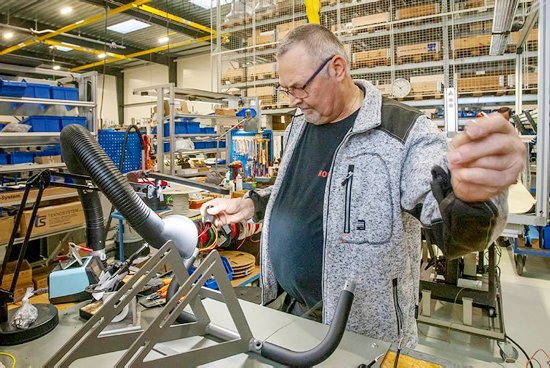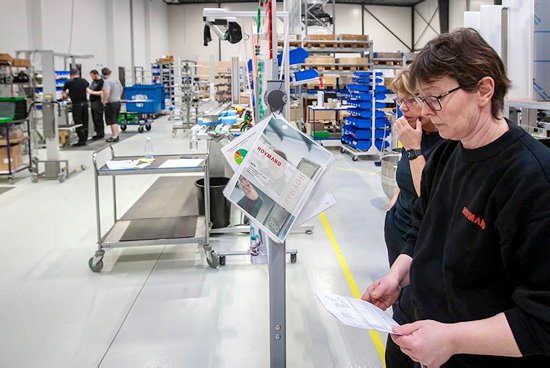Sustainability is expressed in many ways at Hovmand A/S
Making tonnes of money regardless of the consequences is no longer cool – whereas humility, inquisitiveness and quality awareness now constitute the groundwork for a good business, explains CEO Søren Hovmand.
By Henrik Førby Jensen
What are the most pressing concerns for a CEO of an innovative, prize-winning undertaking in terms of sustainability? We meet Søren Hovmand at the Hovmand A/S headquarters in Køge.
His reflections concern both the future and the past and deal with the inherent values in production processes and corporate culture.
»In the 1980s, it was hip to earn a lot of money, so it didn’t really matter if you made a mess along the way. Now, it’s uncool to be rich, in that sense that humility has become an essential virtue. We are humble in our approach to our tasks: it is no longer a matter of simply earning as much money as possible. It’s more broadly based than that,« explains Søren Hovmand with a friendly, open look.
Uncommon French colleagues
The company is permeated with lively meeting activity this Tuesday afternoon. All its meeting facilities are booked, and four newly-hired sales reps from the company’s French subsidiary are paying a visit. Their division is the latest new developmental feature at the company, which produces lifting equipment for business and industry.
»Three out of the four people from France are women, expressing a sustainable approach to gender in the sector,« Søren Hovmand points out.
»We didn’t hire them because they’re women though; we hired them because they were the best. But this is unusual in our sector and it epitomises our approach. We are also a little careful, however, in terms of how we can take the next step towards greater diversity. It’s not enough to just articulate our intentions; we also have to abide by what we say,« the CEO says.


Sustainable company
The company’s Køge headquarters were officially opened in 2019, and sustainability has been a guiding principle here, too. Photovoltaic solar panels on the roof account for 25 pct. of the company’s electricity production, and an efficient LEAN layout minimises wasted time and minimises fuel consumed by the production and transport processes.
»We save a lot of resources. We used to do a lot of driving around to visit customers. This worked quite well in fact, but it was expensive and we squandered a lot of diesel fuel in the process. During the pandemic, we learned to do our customer visits online, and our customers can also use the APP18 system to go online to select the products they need; it works somewhat like building with Lego bricks. Afterwards, they can book a meeting with our consultants; we can demonstrate our products in our television studio, and then they can place their order,« explains Søren Hovmand, indicating how the sustainability approach is reflected on the bottom line as well:
»We’re actually selling more now per sales rep that we did before the pandemic, and we’re saving quite a lot of fuel. And whenever we save energy, we’re saving money, too. We don’t fly to as many meetings as we used to either,« the CEO states.


Green rooftop initiatives
As mentioned, there are photovoltaic solar panels on the flat roofs, and Søren Hovmand is also considering his options for increasing the biodiversity outside on the company grounds.
»We’d like to have more vegetation around the building. Although the roof may not be able to support a large vegetable garden, it could accommodate a few beehives, and perhaps we need to surround ourselves with a bit more wildlife, too. Perhaps we should increase the number of electric vehicles in our fleet – in fact, I think we must,« he ponders.
In the production process itself, it is generally challenging to cut down on electricity consumption any further. In this respect, external suppliers are responsible for roughly 96–98 pct. of the company’s overall consumption.
»Should we pack things in cardboard or recycled paper and use disposable pallets? It’s not that simple. In return, our products have a very long service life, and we’re considering whether we can come up with a scheme that enables the materials to be returned to us instead of being scrapped. We’re also looking at products that don’t need to be inspected by a service technician whenever the batteries have to be changed. We envision sending new recirculating battery boxes to our customers, who install them in the lifting trucks and return the used batteries to us. This way, we simplify the process and ensure a green workflow,« Søren Hovmand explains.


People and Culture
At Hovmand A/S, sustainability is also embodied in the company’s employee culture and interpersonal communication. Last summer, a HR Manager was hired to manage its People and Culture department. This involves upholding and developing the company’s set of values, which are founded on four basic principles.
»We must be ambitious. This means that we must do things properly. We must be innovative: we must toy with our ideas and be accommodating for new ones. This is simply the way we run our business. We must be respectful in our interpersonal communications. And we must be considerate. But what does that mean, exactly? It means, among other things, that we don’t have room for male chauvinists or anyone else who comes in and takes the air out of the room by being inconsiderate simply because it’s possible, because our colleagues are open and honest. This is also why we thoroughly prepare new job positions and thoroughly onboard new colleagues, too,« the CEO says.
He sums up:
»Our vision is sustainable development. We have to be able to attract the right employees. Our employees must like working here, and it must be possible for them to develop themselves personally. We mustn’t pollute or contaminate our surroundings. But we must also make money. We think that this is a sustainable approach.«
Young people set an example
One of his own daughters is a vegetarian, and in general he sees a young generation who are shouldering big responsibility for the world’s development, and he also considers their demands for a better world from a much wider perspective.
»They are making choices that require them to remove themselves from the equation. By doing things for a bigger cause. How will people remember Greta Thunberg 2,000 years from now? What did people think about Jesus 2,000 years ago?«